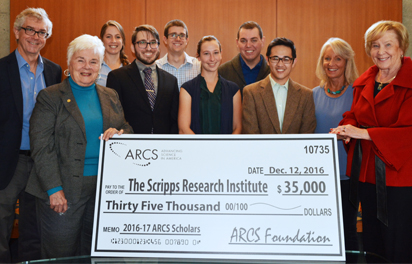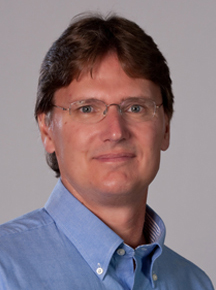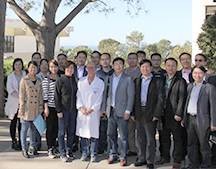In Brief
Thomas Kodadek Elected NAI Fellow
Thomas Kodadek, chair of the Department of Cancer Biology on the Florida campus of The Scripps Research Institute (TSRI), has been named a Fellow of the National Academy of Inventors (NAI).
This distinction recognizes academic inventors who have demonstrated a prolific spirit of innovation in creating or facilitating outstanding inventions and innovations that have made a tangible impact on quality of life, economic development and the welfare of society.
Kodadek’s research focuses on chemical biology with an emphasis on translational research, employing a broad spectrum of techniques that span organic chemistry and molecular genetics, with implications for Alzheimer’s, neuromyelitis optica, multiple sclerosis, pancreatic cancer, narcolepsy, chronic lymphoid leukemia and other conditions.
Election as an NAI Fellow is an honor bestowed upon academic inventors and innovators by their peers. This year’s 175 new Fellows are named inventors on 5,437 issued U.S. patents, bringing the collective patents held by all 757 NAI Fellows to more than 26,000.
Kodadek joins four other NAI Fellows among the TSRI faculty, including President Peter Schultz. This year’s class will be presented with a special trophy, medal and rosette pin during the Sixth Annual Conference of the National Academy of Inventors in Boston in April.
For more information on Kodadek’s work, please visit his faculty webpage and lab website.
TSRI Graduate Students Receive ARCS Scholar Awards
Seven graduate students at The Scripps Research Institute (TSRI) have received Scholar Awards from the San Diego chapter of the Achievement Rewards for College Students (ARCS) Foundation, a national organization dedicated to advancing science in the United States through grants to academically outstanding U.S. citizens pursuing degrees in science, engineering or medical research.
The award recipients are
- Danielle Grotjahn
- Chris Cottrell
- Michael Ledbetter
- Daisy Johnson
- John Tat
- George Campbell
- Rigo Cintron-Colon
This year also marked the twentieth anniversary of the first ARCS scholarships given to TSRI students. The program is funded through corporate, foundation and individual donors.

Leaders from the ARCS San Diego Chapter visited the California campus of TSRI on December 12, 2016 to present the awards to this year’s scholars. From left to right are: James Williamson, dean of graduate studies and vice president of academic affairs; ARCS Chapter President Mary Fitz; ARCS Scholars Danielle Grotjahn, George Campbell, Michael Ledbetter, Daisy Johnson, Chris Cottrell and John Tat; Kim Doren, ARCS member; and ARCS Chapter VP/President Elect Helga Moore. (Photo by Madeline McCurry-Schmidt.)
Dixon Lecture Featuring Klaus Rajewsky Scheduled for February 23
The 2017 Frank J. Dixon Memorial Lecture, featuring a presentation by immunologist Klaus Rajewsky, will be held Thursday, February 23, 4 PM, at The Auditorium at TSRI.
Rajewsky is a research group leader at the Max Delbrück Center for Molecular Medicine in Berlin, Germany. His studies focus on mechanisms of normal and malignant development in the immune system. Rajewsky is renowned for his work on B cells and has been honored with several awards, including the Robert Koch Prize and Ernst Jung Gold Medal for Medicine. He is a member of the National Academy of Science and the American Academy of Arts and Sciences, has served on various scientific advisory and editorial boards, and has authored more than 400 research articles. Rajewsky will speak on “Cellular competition, surveillance and fitness of normal, virus-infected and malignant B cells.”
The annual lecture honors Frank Dixon, a pioneering immunologist who for many years led the research division of the Scripps Clinic and Research Foundation (predecessor organization to TSRI). He passed away in 2008 at the age of 87.
ScrippsAssists to Support San Diego Burn Institute’s Burn Run 5K
ScrippsAssists seeks volunteers from the California campus to help promote Burn Awareness Week by staffing the third annual Burn Run 5K, held at Road Runner Sports in Kearny Mesa on Saturday, February 4, 2017.
Four volunteers are needed from 7:30 to 11 AM to assist in various duties, including event setup/cleanup, event check-in, water station assistance and course monitoring. For those interested in running or walking the race, admission is $30, with proceeds going directly to the Burn Institute. All are welcome, including furry four-legged friends.
The Burn Run 5K will showcase local community partners and provide safety tips and information to all participants. Founded in 1972, the Burn Institute offers lifesaving fire- and burn-prevention education, funds vital burn research and treatment, and conducts support programs for burn survivors.
To volunteer, contact ScrippsAssists Project Lead Mishelle McClanahan-Shinn at mshinn@scripps.edu. For more information on the Burn Run 5K, visit https://fundly.com/burn-run-5k-2017.
Send comments to: press[at]scripps.edu















